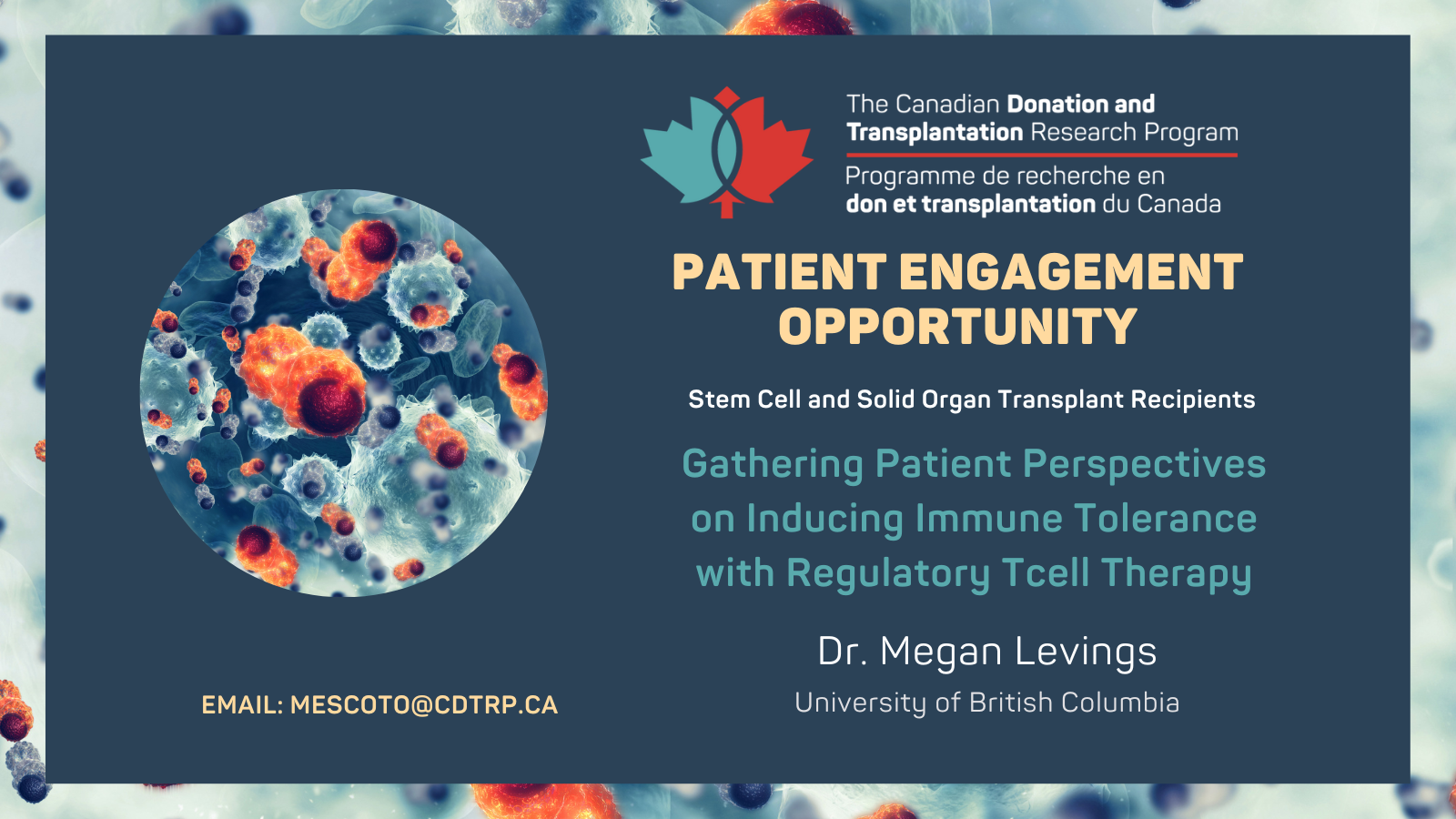
Qualitative Study: Gathering patient perspectives on inducing immune tolerance with regulatory T cell therapy
- Logistics
- Virtual
- Anticipated time commitment
- 2 hours
- Application deadline
- Type of Organ
- Stemcell
- Opportunity Type
- Research Participant
- Theme
- T4 - Optimizing Immune Systems, T5 - Restoring Long-Term Health
Regulatory T cells (Tregs) are naturally-occurring immune suppressing cells that are critical for the prevention of inappropriate immune responses and for the regeneration of damaged tissue. The use of Tregs as a 'living therapy’ to prevent autoimmunity and transplant rejection is considered hugely promising and currently Tregs are being tested in early-phase clinical trials.
One limitation of current cell therapies is the fact that they are typically isolated from patient blood or a stem cell donor before being expanded to large numbers in the lab and re-infused into the patient. In this model, one patient generates one batch of cell therapy product. As this process is hugely complex and expensive, this limits the accessibility of this therapy.
Our group has been working to manufacture off-the-shelf clinical-grade Tregs that can be infused into transplant recipients to reduce the likelihood and severity of transplant rejection.
We are the first group in the world to use human thymus tissue instead of blood as the Treg source. A portion of thymus is routinely removed during infant heart surgery and usually disposed of. As the thymus is the place where Tregs are produced, we can isolate very healthy Tregs from a small amount of thymus tissue and grow them into large numbers. They are then frozen in batches so they can be used as an off-the-shelf therapy for unrelated individuals (allogeneic approach). The ability to treat several patients from one donor source with a readily-available product vastly reduces the cost and increases the accessibility of this cell therapy.
To date, all Treg-based therapies tested in the clinic have been shown to be safe. While they are generally linked to reduced requirements for drug-based immune suppression and reduction of graft rejection, this emerging therapy would likely be much improved by use of healthier and genetically-modified Tregs.
We plan to test our thymus-derived Treg approach for the first time in humans as a therapy to reduce graft vs. host disease (GVHD) after a blood stem cell transplant. A blood stem cell transplant is potentially a curative treatment for patients with chemotherapy-resistant blood cancers. However, GVHD, which occurs when the new immune system rejects the recipient’s tissue, is a devastating and common side effect of this type of transplant. Reducing the risk and severity of GVHD could greatly improve patient health outcomes. We are currently applying for Health Canada approval for this clinical trial and if successful, aim to do the first-in-man phase 1 trial in 2025 (funding allowing). As part of this project, we are trying to understand the patient’s perspective on the use of Treg cell therapies to induce tolerance in transplant patients.
Experience required
If you are a patient that requires a stem cell transplant for a blood cancer or a solid organ transplant recipient. No other previous experience is needed.
Potential roles for PFD Partners
In this study, we will ask patients if they would be open to receiving a Treg therapy, what their hopes and concerns would be, and what sort of information we should be providing with the clinical trial material to help them make the best decision.
- Ideally, you will attend a background presentation about the research project. During this presentation, you will have the opportunity to ask questions and comments (1 hour commitment). The presentation will be held on Tuesday, January 30, 2024, from 6:00 - 7:00 pm ET.
- After the presentation, you will receive a survey to complete (1 hour commitment)
- If you consent to further contact, following the survey and analysis of themes, we may invite you to participate in a group discussion to discuss results and provide you with an opportunity to clarify or expand on these results (1 hour).
Reimbursement
Participants will receive a $25 gift card for completing the survey and presentation.
A smaller group of participants may be invited to a 1-hour focus group and will be eligible for another $25 gift card.
How to get in touch
- Name
- Manuel Escoto
- Job title
- CDTRP Patient, Family, and Donor Partnership Manager
- mescoto@cdtrp.ca
- 10 - 15 stem cell transplant patient partners.
- 10 - 15 solid organ transplant recipients.
- The presentation will be held on Tuesday, January 30, 6 pm ET
